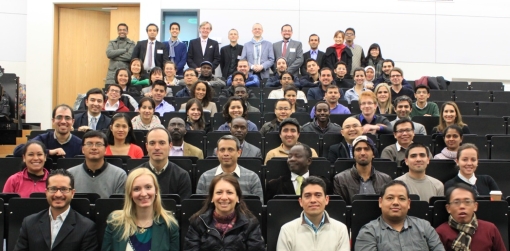The unique DAAD postgraduate degree programme Small Enterprise Promotion and Training (SEPT) looks back on 20 successful years. At the Universität Leipzig, international guests came together for a birthday celebration and alumni seminar.
For two decades, SEPT has worked intensively to promote small and mid-sized companies in developing and transition countries. Today, the international SEPT network is vibrant and strong. “In the early days, SEPT was mainly about helping micro-businesses to survive,” explains Universität Leipzig Professor Utz Dornberger, who has been director of the degree programme since 2004. “But today the emphasis is more on helping these companies to really develop and grow.”
Service and Sustainability
For its birthday celebration, SEPT organised a week-long event, inviting over 100 guests and 38 alumni from all around the world to attend a symposium and alumni reunion in Leipzig. The main focus was on the coexistence of nature, business and society as the basis for sustainable economic development. “We wanted to introduce a new perspective to the sustainability debate and looked toward human services,” says Utz Dornberger. The impulse came from another important birthday in 2012: the 20th anniversary of the Rio Declaration on Environment and Development. The Rio Declaration is not just about environmental protection, but also about equal opportunity for all peoples and the chance to pursue self-fulfilment and live in dignity. As Dornberger points out, this is where Rio and SEPT come together: “This pertains directly to small business owners and service providers just as much as it does to government, which is obligated to care for its citizens.”
Art in a former stockyard
SEPT alumni presented many interesting examples of small and medium-sized businesses that provide valuable services while continuing to develop and grow as companies – whether in tourism, the energy sector or in the waste or creative industries. DAAD alumna Claudia Verónica Rios Heredia reported from Bolivia on “El mARTadero” – a former animal stockyard and slaughterhouse which has been very successfully transformed into a hip new location for small companies in the creative industries. Typically the creative industries consist of very small companies, says Dornberger, who added that freelance designers or artisans tend to locate their workshops together in places such as the El mARTadero stockyards.
Another impressive example was the transformation of the Colombian city Medellín from drug capital to creative-industry hot spot. Colombia native and DAAD alumna Adriana Perez explained how – with support from the municipal government – more and more small and medium-sized businesses in the arts and creative industries moved in to Medellín, opened their doors and created jobs. “This is not just an important example for developing countries,” stresses Dornberger, “but for countries like Germany as well.”
A valuable forum
“I profit very much from other people’s experiences,” says Diego Gonzales. A native of Argentina, Gonzales was particularly interested in the example of SEPT alumnus Jorge Fernando Garcia Abaroa from Mexico. “He demonstrated how Mexico City is working together with private-sector companies to successfully promote a recycling programme in the city.” Gonzales completed the SEPT postgraduate programme in Leipzig in 2002 and works today as a programme manager for an industrial company in Buenos Aires. The alumni reunion in Leipzig was a highlight for Gonzales and a valuable forum for learning, exchange and networking. “Waste is an area that I knew almost nothing about,” reports Gonzales. “Now, in just a week’s time, I’ve learned a great deal about it and many other topics as well.”
Another topic of the symposium was supplying electricity to rural areas through small business powered by micro-finance loans. Alumni gave lectures on the topic and presented practical examples. According to Dornberger, decentralised power supply technologies such as solar home systems support small companies that need power for drying coffee or cocoa beans. “The sale or maintenance of these kinds of technologies is where the small and mid-sized companies come in,” he adds.
Alumni as central players
The alumni reunion in Leipzig reflected the diverse and vibrant network that, according to SEPT director Dornberger, is an integral part of the degree programme’s identity. The idea is to continue to grow the network through the SEPT alumni. “As an example, our alumni can serve as trainers in the Latin American private sector in areas such as innovation process management.”A dedicated website bundles the various initiatives under the title “Intelligence for Innovation” (www.in4in.net). Alumni also organized a Master’s programme in business development for small and mid-sized companies, which has been offered at two locations in Vietnam since 2005. And SEPT alumni were also largely responsible for a new partnership among five African universities designed to promote technology transfer and business start-up. “Alumni have been our key players for many years now,” says Dornberger.
“Alumni reunions are a fantastic opportunity. It’s a chance to step out of the daily work routine, clear the head and make room for new perspectives in dialogue with the other alumni. That is very important to me.”
Diego Gonzales, SEPT alumnus (2002) from Argentina






